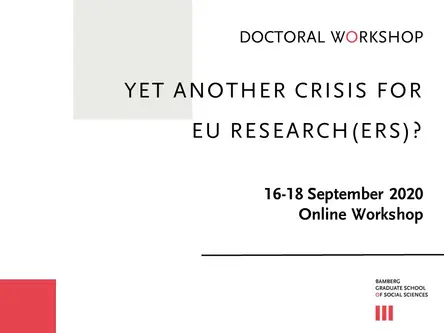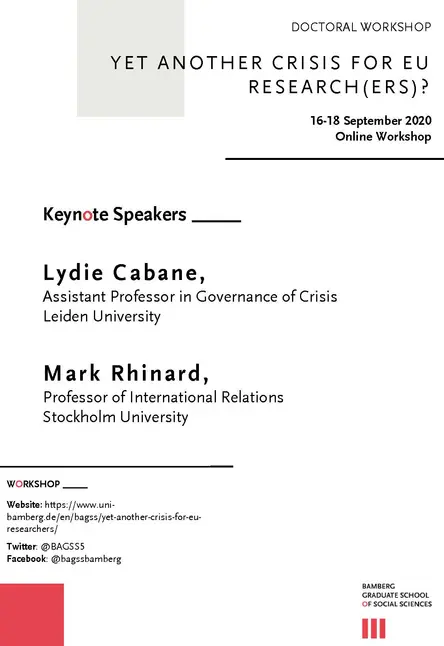
DOCTORAL WORKSHOP ▼
YET ANOTHER CRISIS FOR EU RESEARCH(ERS)?
ONLINE WORKSHOP, 16-18 SEPTEMBER 2020
____Workshop Content
Since the beginning of the 2000s the EU has seen several crises. Those were not the first in the EU’s history and probably they will not be the last. With the Covid-19 lockdowns, contact restrictions and other countermeasures, we now experience yet another crisis. It is very likely that some EU scholars will argue that this crisis is promoting European integration while others will consider it as a threat. Beyond the impact on research agendas, our work as researchers is affected by the current crisis as well.

____Keynote Speakers
Wednesday, 16.09
Mark Rhinard,Professor of International Relations, Stockholm University
How crises influence the policy system
Thursday, 17.09
Lydie Cabane,Assistant Professor in Governance of Crisis, Leiden University
The concept of crisis in social sciences: challenges and controversies
____Abstracts
- Carlos D. Bravo Laguna, Universitat Pompeu Fabra / IBEI
Networking to Prevent a Global Pandemic: The Role of Europe in the 2014-2016 Ebola Outbreak
This paper assesses the extent to which European actors intervene in the response to external transboundary crises that mobilize the international community as a whole. It does so by examining the role and weight of the actor constellations that managed the 2014-2016 Ebola Virus Disease epidemic in West Africa. A virulent outbreak of the Ebola Virus Disease killed thousands of individuals in this region between December 2013 and March 2016; particularly devastating were its effects in Guinea, Liberia and Sierra Leone. The resolution of this crisis became a public health priority for the European Union after a Spanish nurse became the first person to contract the disease in Europe, given that this incident increased exponentially the risk of contagion to EU citizens. This puzzle is studied through the use of social network analysis, a methodology that provides novel empirical evidence supporting that the responses to external transboundary threats that are potentially global in scope are organized under a multilateral logic, with the EU adopting a secondary role. This network has been built on the basis of information extracted from a survey that was distributed among a series of experts who contributed to the management of the Ebola crisis as well as from a series of semi-structured elite interviews.
- Johanna Schafgans Muñoz, Philipps-Universität Marburg
Crisis as a Permanent Challenge for EU Research(ers): Crisis-like Changes in Power Relations and Hegemonic Shifts–the Case of Spain
Years after the outbreak of the global financial crisis, which then developed into a ever ongoing European economic and monetary crisis, a new dimension of multiple crisis processes has reached the EU. The Covid-19 crisis reveals the power relation and hegemonic shifts, which has been put into operation thirteen years ago: The reform policies implemented duringthe European crisis processes have changed the political, economic and social structures in the European member states in many ways. Populist actors profit from these instabilities and continue to challengecurrentpolitical systems.These various crisis processesand the divergent discourses on how to manage them have called the progress of European integration into question.How are the various moments of crisis, such as the financial and euro crisis, the so-called refugee crisis, the crisis of democracy in Europe and populism related? How do they affect the handling of pandemic apocalypses? How can the divergent developments and the different strategies on the management of the crises within the EU and the member states be explained? And how did these developments affect the European integration process?In my paper I claimthat the answer to these questions can only be foundwithin the structure and design of the EU itself.My hypothesis is that the disputes and divergent strategies of ‘power actors’ can on the one hand be traced back to country-specific factors –the crisis-like developments affect different states in different forms and intensities. Onthe other hand, these specifitiesare the result of international interdependencies, i.e. they depend on theirposition in the European powerconstellation. This means that both national and European forces are necessary for the implementation of reforms, since national forces have co-decided the European guidelines and must implement them in their sphere of power. It is therefore important to work out the political leeway and scope of nation states within the transnational EU regime.
- Melek Aylin Özoflu, Corvinus University of Budapest
The impact of the cumulative crises of the European Union on the European Identity research
The European integration process has entered a new phase of instability and uncertainty due to cumulatively experienced and recent crises that have confronted the European Union (EU). Such a setback is directly related to serious questions and challenges that have posed a threat against the EU's integrity, balance, and cohesion. Contrary to previous crises, the EU has currently experienced multiple, more intensive, and interdependent crises more or less simultaneously. The seriousness of the Union's current context of the crisis has diverted the attention of the EU researchers from the traditional debates on European integration to the accelerated debates on the future of Europe, including the scenarios of differentiated disintegration. In this context, tracing the levels of sense of belonging to and identification with the EU has gained critical importance. Therefore, this research aims to address how the research agenda on the European identity, which is highly regarded as the source of legitimacy of the EU institutions, is affected and shaped by the cumulative crises of the Union. To this end, it will conduct a systematic literature review using MAXQDA qualitative data analysis software, which will help collect and analyze a large body of secondary data. Special time focus will be from the period of reflection of 2005 to the recent debates on the repercussions of the outbreak of the Coronavirus crisis.
- Yi-Jhen Wu, University Medical Center Göttingen
How social scientists can stay engaged in research using technology during the pandemic?
As the outbreak of COVID-19 slams the world, working from home and offering online courses are promising solutions in higher education. On the other hand, these new policies seem to be challenging for researchers, because the policies might have an impact on their research plans. Although these policies might limit research development, they also highlight how social scientists can take an advantage of using technology to conduct research. In my contribution, I would like to emphasize on how quantitative researchers could potentially continue to conduct research via technology during the pandemic. In the presentation, I will discuss how to collect data, how to initiate research, how to maintain regular communication with team members, how to document analyses, and how to provide social support to team members. During my presentation, I will use ongoing projects and my current COVID-19 project as examples to illustrate the above-mentioned points in a cross-countries collaboration context.
- Nils Stockmann, Westfälische Wilhelms-Universität
Governing and researching the plurality of crises: Prospects and challenges of research on EU sustainability politics in Covid-19 times
What does it mean for (early career) scholars to facilitate research in this plurality of crises? In my proposed contribution, building upon my observations, I will argue that the collision of crises presents itself as an open juncture for research. Much has become less certain, path dependencies and assumptions once to be taken for granted seem to be cracked open. All this is challenging: Many channels for fieldwork are closed, potential interviewees are reluctant to meet with (early career) researchers, whilethings are in flux (not to speak of personal situations). Research plans, including my own, will, therefore,have to be readjusted. Still, for studying sustainability politics in the EU and beyond the plurality of crises does also offer a lot.Never before has there be an opportunity structure like this to integrate -synchronize –two crises so that they might redefine the discursive and structural avenues of the EU. Offering a critical and constructive reflection on these dynamics is likewise a rewarding, necessary task for social science research as well as a cornerstone for readjusting one’s own research.
____Organizers
Alina Jasmin Felder, Doctora Fellow at the Bamberg Graduate School of Social Sciences
Lara Panning, Associated Member at the Bamberg Graduate School of Social Sciences, Research Fellow for the Project Democratic Legitimacy in the EU: Inside the Black Box of informal Trilogues
........................................................................................................................................................
MAIN PAGE | CONTACT | LEGAL | PRIVACY POLICY | DATENSCHUTZ | IMPRESSUM
© Bamberg Graduate School of Social Sciences
Image Credits: © Bamberg Graduate School of Social Sciences